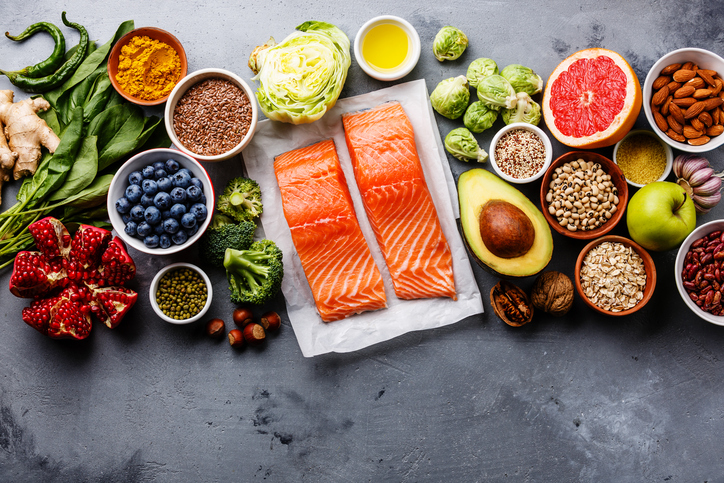When I work with my clients, I focus on the “Trio of True Happiness” which involves discovering each clients spirituality, working through specific areas of our past which hold us back, and developing proper dietary habits. The last facet, diet, is arguably the one area the majority of my clients overcomplicate and don’t fully understand the need for proper diet and the effects it can have on their lives. As with anything, keeping it simple is the key and diet is not as complicated as many people think!
Sure, that doesn’t mean there isn’t some amount of experimentation that may need to take place to figure out what works best for your particular body type and dietary needs, but regardless of whether you choose to be gluten free, plant based, no dairy, or another form of dietary structure, the end goal is to properly balance our hormones through the food we ingest.
I know when my clients are serious about change when I see them take the time to experiment with their diets as we work through their 90-day program, as well as how they key in on how their new dietary choices make them feel. Even though they may not realize it, their happiness is based upon the fact their newly formed dietary habits are contributing to proper hormonal balance, and proper hormonal balance means an improvement in feelings of well-being and mood!
It’s no secret that women are much more complex than men in many ways, and the biggest difference and complexity is in their hormones. While the primary men’s hormone is Testosterone, with small amounts of the androgens being present, for women we have a more complex mix of hormones with estrogen and testosterone being the primary sex hormones along with their various other derivatives. When our hormones are out of whack it can be manifested in various ways such as weight gain, lack of libido, depression, mood swings, lack of energy, etc., all of which aren’t real appealing for us and people around us.
So how do we manage and control our hormones in as optimal as a state as possible? Through our diet!
If we eat properly and can figure out what food choices work for us, the next step is ensuring we are not leaning too far to one side of the spectrum and/or eating unbalanced meals. In order to properly regulate insulin levels in the body, we need to take in balanced meals of carbohydrates, protein, and fat which will help stabilize insulin and regulate blood sugar, and place the body in an optimal state of energy use and consumption. In other words, your body gets what it needs, burns what it needs in glycogen and body fat, and has less likelihood to store excess/unbalance food intake as body fat!
Many people do not realize insulin is actually a hormone and probably the “master” hormone in the bodies of both men and women. If insulin is properly regulated and maintained through diet, then the sex hormones fall properly into place and the body functions much more optimally. If your insulin levels are out of whack, well then so are your sex hormones and your life is most likely going to be filled with a lot of up’s and down’s and frustrations.
So what exactly does a balanced meal look like? It’s not as hard as you may think…
First, you must understand what carbohydrates, proteins, and fats are and what they do for our bodies. All of these are what we call “macronutrients” or as the fitness crowd likes to refer to as “macros”. If you are not super savvy on macronutrients, take a few minutes to do some basic internet research on what constitutes a carb, protein, and healthy fat source. Yes, fat is actually good and necessary and it is NOT a bad thing like western dietary models have pounded into our skulls for many years. Without fat, our body cannot properly digest and regulate the carbohydrates we take in and this greatly affects our insulin levels in a negative elevated manner, which causes a host of issues to follow. If you’ve ever wondered why a “no fat” or “low fat” diet or food product didn’t work, it’s because the fat that is needed to buffer the carb intake is missing and your insulin levels are elevated and wreaking havoc on your bodily functions and hormones! When a “low fat” or “no fat” food source is made it tends to be higher in carbs, which creates a vicious cycle of too much carbohydrate in the diet which can’t be buffered during the digestive process and this leads to the increased insulin levels, which leads to bad things, which…well you get the picture – it’s a vicious cycle. Try to ensure your diet is higher in Omega-3 fats rather than Omega-6 fats, which tend to be consumed in much higher amounts in western diets and cause issues at a cellular level.
Whether you are a plant based or consume a standard diet with meat sources, all of these macros are available to you in any dietary program and need to be consumed together in proper amounts to equate to proper insulin control and subsequent hormonal balance. If you are a numbers type person and don’t mind weighing and measuring, using the “Zone Diet” principles of 40% Carbs/30% Protein/30% Fat has worked well for myself and my clients in placing them in the ballpark and getting their insulin and hormones under control and then allowing them to feel more energetic, reduce body fat, and improve overall mental clarity and well-being. While many people may consider the Zone a “fad diet”, the truth is it works and has been proven in countless day to day people and elite athletes.
For those of you who are a bit more inclined to eyeball things, a rough guide is to eat an amount of protein roughly equivalent to the size and thickness of the palm of your hand, take in low starch veggie based carbs in roughly twice that amount, and then add a 2-3 tablespoons of saturated and monounsaturated fats to your meal/vegetables/salads to take in the proper amount of fat. It’s a rough estimate but it works well enough to get things back in line. If you are eating simple starchy based carbs like sweet potatoes, carrots, etc., you may wish to decrease the size of the portion a tad since they are more dense and will pack more energy punch over a longer digestive time. Really simple carbs such as bread, rice, pastas can be reduced as well since they will break down quickly and elevate insulin levels rapidly. If there’s fat in the diet, this breakdown and absorption process is slowed down to a trickle of blood sugar into the bloodstream and insulin levels will rise slowly, not spike out of control and then crash due to a lack of fat in the diet.
While there’s much more to all of this than can be covered in a blog post, this is a rough basic guideline to get you thinking about small steps you can take to improve your life and start to balance out your hormones and physical well-being through your diet. It’s incredible how much our diet controls other areas of our body we don’t even think are related, but it’s true! If you start changing your diet, you will start to change your mood, libido, body composition, energy, and well-being, and who doesn’t want that!
If you want more information or help with your diet and life, I urge you to reach out to me for a free consultation so we can discuss what you’d like to change in your life and how I can help you achieve your goals by working together toward a new you!


